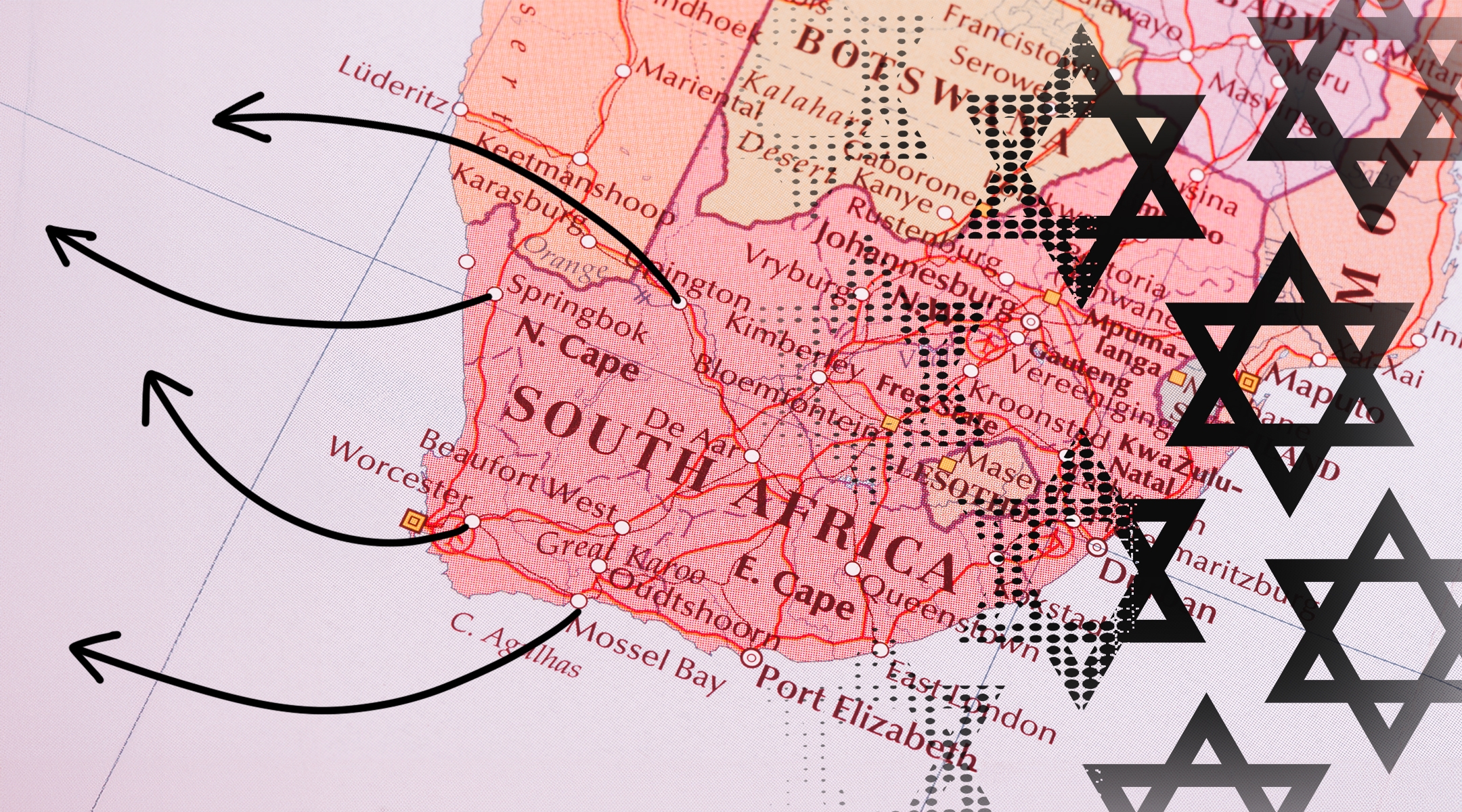Jewish teens in South Africa, where crime and Israel criticism are sky-high, see little future at home
Antisemitism and a lack of opportunity are pushing young people to study abroad or move to Israel

(Design by JTA)
This article was produced as part of JTA’s Teen Journalism Fellowship, a program that works with Jewish teens around the world to report on issues that affect their lives.
(JTA) — When she was in sixth grade, Kiara Cohen decided she was going to leave South Africa.
At a Shabbat gathering held by the youth organization Bnei Akiva in Kempton Park, Johannesburg, she was on the way to fill her water bottle when a few adults on the other side of the fence from her campgrounds told her they were going to assault and kill her and her friends because she was Jewish. The scared 12-year-old decided on the spot that she wanted to live somewhere where antisemitism wasn’t tolerated.
Now 16, Cohen still has her marks set on leaving South Africa after university — a move that would make her typical of her country’s Jews. Since 1970, the number of Jews in South Africa, home to the continent’s largest Jewish population, fell by 60%, to 50,000, according to the Institute for Jewish Policy Research. Many of those who depart head to Israel, where anyone who is Jewish may immigrate. In 2021, a full 1% of Jewish South Africans moved to Israel — the highest aliyah rate in South Africa’s history.
And that was before the current Israel-Hamas war, in which South African leaders have been taken an aggressive anti-Israel stance. The country has brought genocide charges against Israel in the International Court of Justice and threatened to prosecute South Africans who serve in the Israel Defense Forces. It has also welcomed a Hamas leader for an official visit since Hamas attacked Israel on Oct. 7.
“The main antisemitism I feel that makes me want to leave this country is the government,” said Danni Hellman, 16, of Johannesburg. “They are anti-Israel and not exactly fond of Jews. I know every country in the world has its problems but when the hate comes from inside the people who are in power it is not exactly easy to want to stay.”
JTA interviewed 20 Jewish high school students from Johannesburg about their future plans. Eighty percent said they are planning to leave South Africa. More than half of them, 55%, said they are leaving after they graduate from high school. Another quarter said they would head for the border after graduating from college.
While some, like Hellman, said the country’s stance toward Israel is contributing to their thinking, most cited more pragmatic concerns: a lack of opportunities for their future and a desire to escape South Africa’s high crime rate. Overwhelmingly, they felt safety concerns about being Jews in South Africa.
“As a young Jew I am planning to leave South Africa due to the antisemitism and due to the social, political and economic circumstances in the country,’’ said Eitan Klein, 16. Last February, while gaming online, Klein was called an antisemitic slur by a South African Palestinian supporter. He said he wants to avoid experiencing that kind of harassment in person by making aliyah and joining the IDF after graduating high school — no matter what the war situation is in Israel.
The Jewish community in South Africa dates to the 19th century, with the immigration of a small number of Jews from Great Britain. Diamond- and gold-mining drew a significant number of Jews in the late 1800s, especially from Eastern Europe, changing the South African Jewish community and forming a strong connection to Zionism. As the 20th century began, Eastern European Jewish immigration continued, and as World War II approached, there were slightly more than 90,000 Jewish people in the country.
During the Holocaust, South Africa implemented an immigration quota that banned Eastern European Jews from entering the country. Despite the ban, 3,615 German Jews came to South Africa. The community kept growing and hit its highest point at 118,200 in 1970. The numbers started going down after 1970, according to South African Jewish Board of Deputies.
The current exodus follows the demise of apartheid in the early 1990s, which while ending years of fiercely racist discrimination against the country’s Black population also ushered in a period of rising crime and economic uncertainty. As many as 1 million white South Africans emigrated between 1995 and 2005; currently whites make up about 4.5 million of a total population of about 57 million.
Several of the teens interviewed said they saw a lack of opportunity in South Africa for future generations. Over 50% of the population lives in poverty and nearly 19% lives in extreme poverty, according to the World Bank. South Africa is also struggling with an extremely high unemployment rate of 33%, daily power cuts, extensive corruption in public entities and high crime rates. Last year, a prominent Jewish South African journalist was murdered in a home invasion — shortly after writing in a column that he thought his young adult children should abandon their country and move abroad.
“It is common knowledge that young Jews are leaving South Africa,” said Rabbi Mendel Rabinowitz of Johannesburg’s based Victory Park synagogue. He said he understood why most young Jews would rather study overseas and use those qualifications to get a job elsewhere, rather than deal with the high unemployment in South Africa.
“The reality is that it’s easier to get into some of the overseas universities than it is to get into South African universities,” he said.
The teens also say vociferous opposition to Israel is palpable in their daily lives. The country’s Israel boycott campaign rebranded as “Africa 4 Palestine” campaign in 2020 and promotes the idea on billboards around the country that Israelis stole Palestinian land. And last year, Aishah Cassiem, a South African politician and member of the provincial legislature, said that Herzlia, the local Jewish school in Cape Town, should be deregistered because a quarter of the school’s graduated students made aliyah and joined the IDF.
She compared the school to the “apartheid state of Israel” during a debate in Parliament.

Herzlia High School in Cape Town, South Africa. In June, a South African politician called for the school to be deregistered over the fact that nearly a quarter of the school’s graduating students move to Israel and join the military. (United Herzlia Schools)
“You can’t just attack one school for making aliyah and joining the IDF,” said Johannesburg teen Tali Bloch, in response to Cassiem’s remarks. “Jews all over the world do this and if this is the reason this school should be deregistered then it’s disgusting and makes me feel irritated and beyond furious.”
Bloch, 16, wants to move to London after high school. “I feel connected to Judaism here in South Africa but I don’t see the county as a place where I want to raise my kids. I just don’t see a future here.”
Not all Johannesburg teens want to leave. “I love my South Africa heritage and definitely think of this country as my home,” said Sam Bonner, 17. “I wouldn’t leave unless I absolutely had to.”
Bonner is active in the Zionist youth group Habonim Dror. “I found my connection to Judaism through youth groups. I found Habonim Dror, and my connection to Judaism only grew stronger,” said Bonner.
Brent Levine, 17, of Johannesburg is also passionate about being Jewish, but says he can’t fully embrace his Judaism while in South Africa because he hasn’t found a group of people with whom he feels comfortable expressing this aspect of himself.
“I’m moving to Israel after I matriculate because it is easier for me as a young Jewish man to fulfill the quest of finding myself spiritually as a Jew,’’ he said.
Levine, a volunteer for Medi Response ambulance service, a medical group in Johannesburg, said his plans haven’t changed with the current situation in Israel, where Israel is seeking to eliminate Hamas after the deadly attacks of Oct. 7. “If I had the opportunity to go to Israel to help fight the war I would,” said Levine.
And for many teens, the pressing issues of the moment pale in comparison to their longer-term concerns.
“This country is questionable at best,” said Hellman, who plans to pursue an acting career in London or Amsterdam after graduating from high school. “If I want kids, I don’t want them to grow up here and I want them to have better opportunities.”
JTA fellow (Fall 2022) Ella Bilu provided reporting and editing assistance on this piece
This article originally appeared on JTA.org.


















